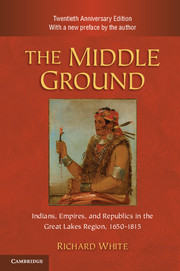Book contents
- Frontmatter
- Contents
- List of abbreviations
- Preface to the twentieth anniversary edition
- Introduction
- 1 Refugees: a world made of fragments
- 2 The middle ground
- 3 The fur trade
- 4 The alliance
- 5 Republicans and rebels
- 6 The clash of empires
- 7 Pontiac and the restoration of the middle ground
- 8 The British alliance
- 9 The contest of villagers
- 10 Confederacies
- 11 The politics of benevolence
- Epilogue: Assimilation and otherness
- Index
7 - Pontiac and the restoration of the middle ground
Published online by Cambridge University Press: 05 June 2012
- Frontmatter
- Contents
- List of abbreviations
- Preface to the twentieth anniversary edition
- Introduction
- 1 Refugees: a world made of fragments
- 2 The middle ground
- 3 The fur trade
- 4 The alliance
- 5 Republicans and rebels
- 6 The clash of empires
- 7 Pontiac and the restoration of the middle ground
- 8 The British alliance
- 9 The contest of villagers
- 10 Confederacies
- 11 The politics of benevolence
- Epilogue: Assimilation and otherness
- Index
Summary
We know them now to be a very jealous people, and to have the highest notions of Liberty of any people on Earth, and a people, who will never Consider Consequences when they think their Liberty likely to be invaded, tho' it may End in their Ruin.
George Croghan to the Lords of Trade, 8 June 1764The Six Nations, Western Indians &c. having never been conquered, Either by the English or French, nor subject to the Laws, consider themselves as a free people.
William Johnson to the Lords of Trade, 8 October 1764The chief crazy enough to dream not so much of the abuse of a power he does not possess, as of the use of power, the chief who tries to act the chief, is abandoned.
Pierre Clastres,Society Against the StateThe events of Pontiac's Rebellion are well known. In 1763, Indians from the Senecas west to the Illinois and from the Chippewas south to the Delawares attacked the recently occupied British posts in the pays d'en haut and, with the exceptions of Niagara, Detroit, and Fort Pitt, took them all. By the end of the year, British reinforcements raised the sieges of the surviving forts. They did not crush the rebellion but stymied it, and it slowed to an inconclusive halt. It was from these events that the nineteenth-century historian Francis Parkman created his History of the Conspiracy of Pontiac.
- Type
- Chapter
- Information
- The Middle GroundIndians, Empires, and Republics in the Great Lakes Region, 1650–1815, pp. 269 - 314Publisher: Cambridge University PressPrint publication year: 2010



